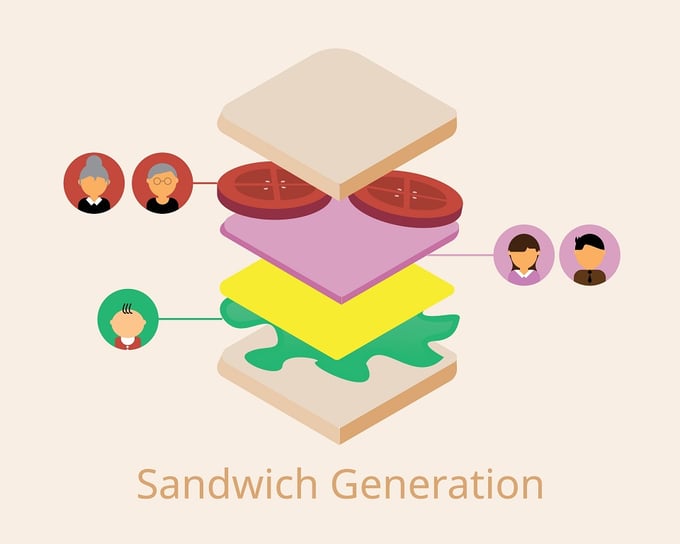If you clicked on this article, you're either wondering what the Sandwich Generation is or you’re a part of it yourself. Either way, the best way to describe this generation in colloquial terms is “neither here nor there”.
They’re not a distinct generation like the “Baby Boomers”, “Gen Y”, or “Gen Z”. Rather, they’re a recurring generational phenomenon that happens when middle-aged working adults (typically aged between 35 to 59) support two categories of dependents — their ageing parents and growing children.
For better or worse, increasing pressure from financially caring for and supporting both groups' welfare simultaneously will put a toll on anybody. Inflation has also made matters worse by contributing to an exacerbated cost of living.
Contextualised to Singapore’s ageing population and emphasis on filial piety, it’s not uncommon to see one’s elderly parents living together in the same household as your spouse and children. With everyone living under the same roof, you’re under constant stress to care for your dependents, inevitably neglecting your own wellbeing.
That said, how did the Sandwich Generation come to be exactly? And is there a way to break this generational burden?
- Who are the Sandwich Generation
- Challenges faced by the Sandwich Generation
- How to cope with being in the Sandwich Generation
- Benefits of being in the Sandwich Generation
- Ending the Sandwich Generation cycle
Introducing the Sandwich Generation
In general, the Sandwich Generation is characterised as middle-aged adults between 40 to 60 years old who are caring for both their parents and children at the same time. The name itself is explanatory because essentially, they’re stuck between a rock and a hard place.
On one hand, their parents are ageing and probably retired. Depending on the amount of savings and the presence of any physical ailments, these elderly parents most likely need some financial support and assistance with physical tasks.
On the other hand, these adults are obviously obligated to raise their own children. Naturally, younguns require more support financially, physically, and emotionally from childhood till early adulthood. And unsurprisingly, funding a child’s education, tuition, childcare, leisure, extracurricular activities and family vacations adds up.
Juggling all those responsibilities whilst fulfilling personal needs and aspirations sounds exhausting. It’s no wonder the majority of the Sandwich Generation feel overwhelmed and burn out easily.
Read more:
How to Build a Sustainable CPF Retirement Income
CPF Retirement Sums — A Complete Beginner’s Guide (2022)
4 Reasons Why You Should Voluntarily Contribute to Your Children’s CPF
8 Ways to Support Parents Financially Without Paying Them
Best CareShield Life Supplement Plans in Singapore (2022)
Challenges faced by the Sandwich Generation
To lessen the financial load on a single breadwinner, it’s more common nowadays for the burden to be distributed between both working adults. This caused a proliferation of dual-income families in Singapore.
According to the Department of Statistics, the proportion of dual-career married couples increased from 47.1% (in 2010) to 52.5% (in 2020).
This consensus was also reinforced by the Ministry of Social and Family Development (MSF)’s report where the proportion of dual-career couples living with at least one child younger than 21 years old increased from 45.9% (in 2000) to 65.6% (in 2015).
Both these findings illustrate that more than half of married couples comprised equally-employed spouses.
See also: 8 Ways to Stretch Your Budget in a One-Income Household
#1 Double pressure from double generations
Don’t be mistaken. We’re not doubting the financial capabilities of dual-income households to support their families. We’re referring to the ramifications brought about by caring for two dependent generations.
While we should celebrate career progression, it also inadvertently transformed the narrative for double-wage families.
Increased financial capacity placed an unfair expectation of capability in supporting double generations.
Given Singapore’s exponential post-war economic growth, our population and family dynamics have changed tremendously in tandem. As our standard of living increased, so has our cost of living.
Back in the 1960s, Baby Boomers were mainly preoccupied with surviving paycheck-to-paycheck and investing in their kids’ education. Since then, our economy developed so rapidly that it far surpassed the savings or CPF of our now-elderly folks, rendering them defenceless against inflation. (Some of them might even be missing out on necessary insurance!)
Meanwhile, a 2021 AIA Survey revealed that young families spend at least 2.5 times more than providing for children than their own retirement savings. This means that half of Singaporeans would be short of at least 14 years’ worth of funds upon retirement age.
Not to mention, only one in five Singaporean youth believe their parents have enough savings for retirement while two-thirds of parents also expect to outlive their savings. In view of this, 66% of youth accounted for the cost of financing their parents’ golden years but only 8% truly felt confident about it.
All this makes balancing retirement goals with childrearing and elderly care nearly impossible. This multi-generational squeeze is literally squeezing the Sandwich Generation’s current and future financial stability. In turn, this begets a generational cycle.
💡 Pro-tip: Managing healthy household finances is impossible without proper planning and tracking. Set up a budgeting system to identify necessities from wants and dedicate your monthly expenditure accordingly from there.
For instance, the Maybank Family & Friends Card is an excellent cashback card for settling groceries, dining, food delivery, and even transport. It features a generous 8% cashback on all these categories so long as you hit the minimum S$800 monthly spend.

#2 Balancing work-life balance between unpaid (family) and paid (job) work
For unmarried or DINK (dual-income no kids) households, maintaining a work-life balance is definitely easier to achieve. The only factors inhibiting that would be an unreasonable boss, frequent OT-ing, job scope, or your personal drive in career aspirations. Otherwise, clocking the 9-to-5 routine isn’t too difficult.
Unfortunately for our Sandwich Generation, once they finish their paid work duties for the day, they’ll be faced with more unpaid work duties at home.
Between fetching kids home from school, packing dinner for the family, tending medication to elderly parents and more, there is little time in between to do much else. Squeezing in an hour’s worth of personal time every night would be considered a blessing.
#3 Longer life expectancy but fewer offspring
While medical advancements have extended our lifespan, deviations from traditional mindsets and practices have led to fewer couples bearing children too.
At first, having fewer child dependents might seem like a solution to the Sandwich Generation conundrum, but it only helps to an extent. Longer life expectancies and falling birth rates mean the ratio of offspring to elders wouldn’t be proportionate. There’ll be fewer children to support their parents in the future.
This could further complicate being a caregiver.
#4 Potential gender disparity in caregiver status
Another concern arising from this would be the gendered differences in sandwiched pressures. Statistically, women have typically been the homemakers while men are the breadwinners. With more women becoming employed, the roles within the household are shifting — but not nearly enough.
Under the presupposition that women are naturally “more nurturing”, many are still expected to “manage” the household on top of their job. This forces women to balance both employment and housewife duties.
According to the 2007 Stress Survey conducted by the American Psychological Association, mothers in the Sandwich Generation “feel more stress than any other age group” due to the “demanding, delicate acts” of caring for multiple generations.
While this doesn’t apply to all dual-income households, this does occur often enough to present as an issue. Other research also shows that more than half of all caregivers are women.
Therefore, there might be an expectation imbalance in roles and responsibilities performed between the mother and father. Conflicts may then arise and cause friction within the family.
💡 Pro-tip: If it’s too overbearing to take care of both young and old, consider hiring a maid to ease the burden a little. Read how hiring a helper can do wonders for your mental health.
#5 Life plans are paused
When one has so many dependents under your care, their own personal life gets put on pause. Priorities shift away from goals and aspirations and towards caring for ageing parents and raising children instead. Family needs are placed above individual needs.
Needless to say, a lot of Sandwich Generation parents feel stuck and completely unfulfilled. Without sufficient personal satisfaction, it’s easy to become mentally and emotionally drained.
#6 Negative implications on mental health
Being in a constant state of emotional distress would inevitably lead to more negative mental health implications like depression.
During Flight Safety Instructions announcements before departure, adults are always advised to secure their oxygen masks first before attempting to help those around them. The same principle applies to the Sandwich Generation too.
You can’t help others without helping yourself first.
Forgoing self-care for the sake of dependents can lead to exhaustion, frustration, loneliness and disdain and incite intergenerational conflicts. This is why taking breaks from time to time is crucial to maintain one’s longevity (and sanity) as a caregiver. After all, we’re only humans.
Read more:
School Didn’t Teach Me: How to Balance Wealth and Mental Health
Mental Health Insurance: What Insurers are Doing to Help Heal When You Need it Most
How to deal with being part of the Sandwich Generation?
#1 Never neglect your retirement plan
This should first and foremost, be your top priority regardless of your life’s circumstances. You might be thinking, “But between growing my high-yield savings account, securing my emergency fund, managing my investment portfolio and paying monthly premiums, what money is left for my retirement fund? Can’t I just let my CPF grow on its own?”
While those are all valid points, relying on CPF alone might not be enough. When it comes to retirement funds, you need to be cognizant of both guaranteed and non-guaranteed income.
Guaranteed funds typically refer to CPF payouts, CPF account withdrawals, Supplementary Retirement Scheme (SRS) savings, money market funds, index funds, Singapore Savings Bonds (SSBs), annuity, and more.
Conversely, non-guaranteed funds refer to more volatile assets in investment such as stocks, investment-linked (IP) insurance plans, commodities, and others.
Since CPF is split into three accounts — Ordinary Account (OA), Special Account (SA), and MediSave Account (MA) — it can fund the three basic retirement needs of housing, healthcare, and retirement fund. Also, the guaranteed interest rates earned on your accounts.
The interest earned by the respective accounts is as follows:
| Ordinary Account (OA) | Special Account (SA) | Medisave Account (MA) |
| 2.5% p.a. | 4% p.a. | 4% p.a. |
That said, there are other ways to boost your CPF savings apart from passively depending on CPF deductions and employer contributions every month.
See also: A Complete Guide to CPF in Singapore (2022)
💡 Pro-tip: Look out for other government subsidies, payouts, and tax reliefs that alleviate your parent’s living expenses.
#2 Dole out responsibilities with siblings (if any)
This might not be relevant for everyone, but sharing the financial load of caring for elderly parents can provide great relief. Discussing finances and logistics openly with siblings helps create transparency, accountability, and effective communication for caregiving. Everyone can pitch in and play their part for ageing parents without bending over backwards unnecessarily.
#3 Understand and monitor parents’ health condition
Along the same train of thought, incurring new health problems as age catches up is inevitable. These ailments can range from minor to severe, or acute to chronic. Hence, it’s pertinent to be aware of your parents’ health conditions and monitor them closely.
Catching these health problems early on is often key to treating them effectively. It also enables you to acquire the appropriate policy coverages, treatment plans, and medicine on behalf of your parents.
Cancer is an example of a deadly and silent killer, especially if detected too late. Upon onset maturation, treatments become less effective. To counter that, you’d want to conduct regular health screenings and ensure your dependents have comprehensive critical illness and health insurance coverage.
Read more:
What Kind of Critical Illness Insurance Do I Really Need?
Money Confessions: I Bought More Than S$700,000 In Critical Illness Coverage While In My 30s — Here’s Why
Critical Illness Plans vs Early Critical Illness Plans: Which Should You Get
Critical Illness vs Cancer Insurance Plans: A Critical Comparison
#4 Living life within your means
This is a no-brainer but what most people don’t realise is that this includes saying “no” to a lot of perceived luxuries.
To save on monthly budgets, you might have to eat out less and reduce takeaways and opt for cooking at home instead. Other families might be able to travel multiple times a year, but you might have to restrict yourselves to once a year.
The sacrifices made within each family’s circumstances are different. It is up to your own jurisdiction to determine how best to manage your household’s finances. Living comfortably means you shouldn’t have to scrimp all the time, but neither should you be splurging on unnecessary luxuries.
#5 Start financial literacy education from young
Prevention is better than cure. Inculcating financial literacy from a tender young age is key to financial acuity later on in life.
You don’t want your child to spend all their pocket money in one sitting. Teaching them the importance of saving, or at least spacing out their expenses throughout the week, will translate into healthier financial habits as an adult.
By empowering them with good financial knowledge, this provides a launchpad for them to grasp more complex concepts and strategies when older.
For example, by understanding how to save S$0.10 each week, accumulating an emergency fund becomes second nature to them. Or perhaps, you help them earn 10% interest on every S$1 saved per week. This helps them understand how to start strategising their investment portfolio at an earlier age.
See also: Financial Planning Tips For New Parents – How To Prepare For A Baby
#6 Insist on early estate planning
Estate planning might also be another area for consideration, albeit contentious. Because it deals with inheritance matters after your parent’s passing, it’s often the breeding ground for internal family conflicts and drama.
However, since estates are assets, ascertaining how they’ll be divided among your siblings and/or relatives is important. In such cases, writing a will is useful in nominating and distributing assets and cash accordingly.
Whether it’s distributed appropriately is a whole other ball game that we shall not touch on. Fairness is subjective in matters of love and money.
Are there any benefits for the Sandwich Generation?
After listing all these downsides, it seems like the Sandwich Generation is doomed to a life of misery. But that’s not entirely true.
For instance, not every grandparent is old, frail and sickly. Healthy grandparents can double up as caretakers for both the home and children. Their wealth of experience and retirement freedom will give them ample time to tend to these matters while the working adults are away.
Depending on your outlook on life, being sandwiched can also be viewed as a way to keep busy and spend time with loved ones. Those that gain fulfilment from productivity will feel recognised and accomplished from settling daily tasks pertaining to their family’s needs. It also presents bonding opportunities with family members through being attentive to their needs.
Thus, such positive effects can be realised as long as stress doesn’t overpower one’s coping ability.
Is there an end to the Sandwich Generation?
For now, the only foreseeable method to end the Sandwich Generation cycle is for each generation to be self-sustaining. If you’re catching our drift, this means that each adult needs a solid retirement plan with minimal assistance required from their offspring.
For context, the CPF Retirement Account (RA) is a combination of the CPF-OA and CPF-SA upon turning 55 years old. Monthly payouts from the RA will then commence a decade later, at age 65, to provide for your retiree’s living expenses until they pass on.
If the RA is topped up to the Full Retirement Sum or the Enhanced Retirement Sum, you can withdraw over S$2,000 every month — more than some part-time job salaries. This significantly reduces one’s financial burden on their adult children.
Read these next:
Guide to Supplementary Retirement Scheme (SRS) & Tips to Maximise It
How Much You Really Need For Your Dream Retirement Lifestyle?
5 Easy Ways to Meet Your CPF Basic Retirement Sum
3 Reasons Why You Should Start Investing With an SRS Account
Pros & Cons of Keeping Your Savings in CPF Special Account
Similar articles
5 Benefits You Are Missing Out On If You Haven’t Claimed Your Merdeka Generation Package
5 Tips for Caring for a Parent With Dementia
8 Ways to Stretch Your Budget In A One-Income Household
Why Do Singaporeans Keep Buying the Wrong Financial Products?
Why You Need To Start Caring About Financial Planning For Your Family
How to Support Your Ageing Parents Without Going Broke
How Buying a Multi-generational Flat Saves You Money
ICYMI: All The Tips & Tricks We Learned From Seedly’s Personal Finance Festival










.png?width=280&name=Investments%20(6).png)